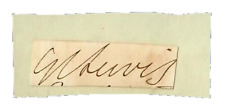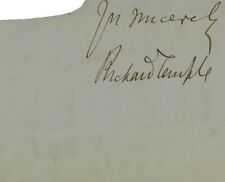When you click on links to various merchants on this site and make a purchase, this can result in this site earning a commission. Affiliate programs and affiliations include, but are not limited to, the eBay Partner Network.
Up for sale the "2nd Baronet" Sir George Grey Hand Signed Free Frank.
ES-3200
Sir
George Grey, 2nd Baronet, PC (11
May 1799 – 9 September 1882) was a British Whig politician. He held office under four John Russell, Lord
Aberdeen, and Lord
Palmerston, and notably served three times as Home Secretary. Grey was the only son of Sir George Grey, 1st
Baronet, third son of Charles Grey, 1st Earl
Grey, and younger brother of Prime Minister Charles Grey, 2nd Earl
Grey. His mother was Mary Whitbread, daughter of Samuel Whitbread.
Grey was educated privately and at Oriel College, Oxford.
Originally intending to become a priest, he instead chose law as his
profession, and was called to the bar in 1826. He began a successful legal
practice, but soon turned to politics. Grey was elected to parliament as a Whig
for Devonport in 1832, and quickly made his mark in the House of Commons. He did
not hold office in the Whig administration of his uncle Lord Grey, Prime Minister in 1834, he was appointed Under-Secretary of State for War and the Colonies. The
government fell in December of that year, but returned to power in May 1835,
when Grey resumed the post of Under-Secretary of State for War and the Colonies (succeeding William Ewart Gladstone).
He retained this office until 1839, when he was made Judge
Advocate General. The same year Grey was also admitted to the Privy
Council. He was then briefly Chancellor
of the Duchy of Lancaster in 1841, with a seat in the cabinet
for the first time. However, the Whigs were defeated in the general
election of that year. The Whigs returned to power in July 1846
under Lord John Russell,
who appointed Grey Home Secretary, the first
of his three spells in this position. In 1846, Grey, "himself a zealous
advocate of hydropathy" succeeded in getting passed The Baths and
Washhouses Act, which promoted the voluntary establishment of public baths and
washhouses in England and Wales. A series of statutes followed, which became
known collectively as "The Baths and Wash-houses Acts 1846 to 1896". This was an important milestone in the
improvement of sanitary conditions and public health in those times. He decided to leave his seat at Devonport,
partly owing to the baths scandal, returning instead for his native Northumberland North in an 1847 by-election, from the
family seat at Fallodon, which he had recently inherited from his uncle, Henry
Grey. The new baronet sat throughout the parliament in active support of Lord
John Russell, until the collapse of the ministry after the scandal of the
Durham Letter, and controversial Ecclesiastical Titles bull. Traditional Whigs
were Protestant, among them Grey, but the liberality of authorising a catholic
hierarchy changed the nature of party politics. Grey's first tenure at
the Home Office notably saw him deal with relief efforts to
the victims of the Great Famine of Ireland and
trying to subdue the Irish rebellion of
1848. The latter year also saw the peak of the Chartist movement, which staged a massive rally in London in April. In 1847, Grey had left his old
constituency in Devonport. He remained Home Secretary until the 1852 general
election, when, despite enjoying widespread popularity, he lost his
seat. Grey remained out of parliament until January 1853, when he was returned
for Morpeth.
He at first refused to join the coalition government of Lord
Aberdeen, but in June 1854 he accepted the post of Colonial
Secretary. The coalition fell in February 1855, and the Whigs
returned to office under Lord
Palmerston. Grey was appointed to his old office of Home Secretary, which he retained until the government
resigned in February 1858. the Earl of
Derby which took office only lasted until June the following
year, when Palmerston again became Prime Minister. Grey was now appointed Chancellor
of the Duchy of Lancaster, but in 1861 he became Home Secretary for
the third time. The government fell in 1866, and Grey was not to hold office
again. Before the 1874 general
election, he was overlooked as the Liberal candidate for
Morpeth in favour of miners' leader Thomas Burt. This marked the end of Grey's public life and he
spent the remainder of his life in retirement at his Fallodon estate in
Northumberland. In 1873 Grey took his grandson, Edward on a tour of Scotland.
The train they were travellers in, pulled in at the tiny village halt of
Kingussie in the Highlands, where they were met on the platform by none other
than William Gladstone.







